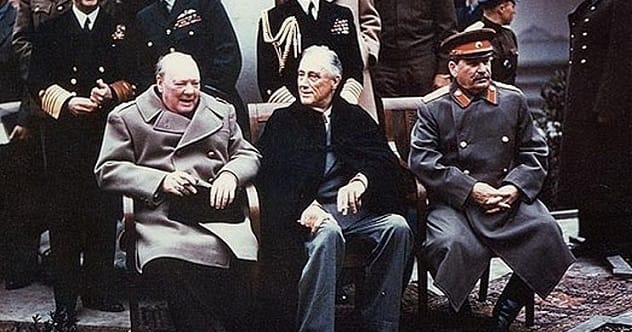Think meetings are dull? Prepare to be surprised! While many office meetings drag on, some gatherings have dramatically altered the course of human events. Join us as we delve into ten such pivotal moments where decisions made around a table reshaped our world forever.
10. The Congress of Vienna
In 1814, following Napoleon Bonaparte’s dramatic sweep across Europe and subsequent abdication, the continent was in turmoil. After a century marked by relentless warfare and widespread civil unrest, the Congress of Vienna was assembled. Its monumental task was to chart a new future for Europe, aiming to stabilize a world shaken to its core.
Key representatives from the Four Great Powers—Austria, Prussia, Britain, and Russia—came together. They aimed to redraw European borders and establish a balance that could prevent future wars. France saw its territory reduced, while Prussia gained considerable land. A new German confederation was also formed. However, some historians view the Congress as a reactionary step by old monarchies against rising liberal and revolutionary sentiments.
Regardless of perspective, the Congress of Vienna established a new European order called the Concert of Europe. This framework maintained relative peace for nearly a century. Yet, this stability eventually shattered in 1914, leading some to argue that the Congress inadvertently set the stage for World War One.
9. Bretton Woods Conference
Even as World War II raged in 1944, 730 delegates from the Allied Nations convened in the unassuming town of Bretton Woods, New Hampshire. The United States, in particular, foresaw that many once-prosperous nations would require substantial financial aid after the war. This situation presented a unique chance to create something unprecedented: a truly regulated global monetary system.
Officially known as the United Nations Monetary and Financial Conference, this three-week gathering led to the establishment of the International Monetary Fund (IMF) and the International Bank for Reconstruction and Development, a precursor to the World Bank. From the end of World War II until 1973, the agreements made at Bretton Woods profoundly influenced global economic affairs and, consequently, international politics. This conference also marked a significant shift, cementing America’s position as the world’s leading superpower, surpassing Great Britain.
8. The First Council of Nicaea
It’s challenging to picture Christianity in its nascent stages. Far from the structured global entity we know today, with its defined hierarchy, beliefs, and practices, it was once a diverse collection of often conflicting groups.
This began to change with the First Council of Nicaea. Convened in AD 325 by Constantine I, the Roman emperor who endorsed Christianity, the council’s objective was to standardize how Christianity would operate as an organized faith. A central issue was defining the relationship between Jesus and God. Opinions varied: some saw Jesus as human, others as the divine Son of God, and a third faction believed Jesus and God were one.
Constantine was eager to quell looming theological disputes. His Council successfully established that Jesus was indivisible from God. This formal acknowledgment of the Holy Trinity, known as the Nicene Creed, has since served as the core theological cornerstone for mainstream Christianity.
7. The Yalta Conference
One of history’s most iconic photographs shows three of the world’s most powerful leaders sitting together: Josef Stalin, Winston Churchill, and Franklin D. Roosevelt. In early 1945, these heads of the victorious Allied nations met in the Crimean resort of Yalta. Their purpose was to deliberate on the world’s future following the imminent Allied victory. Among their agreements was the decision to try prominent Nazis as war criminals.
A particularly significant outcome was Stalin’s pledge to allow free elections in Eastern Europe. This promise, however, was not kept, and Communist regimes were subsequently established in nations like Bulgaria and Hungary. Consequently, while the Yalta Conference was succeeded by more formal assemblies to manage post-war affairs, this initial meeting significantly shaped post-war Europe. It effectively laid the groundwork for the Cold War, the defining global conflict of the latter half of the 20th century.
6. Themistocles Convinces the Athenians to Build a Fleet
Themistocles, an Athenian statesman and general born in 524 BC, played a crucial role in shaping ancient Greece. Though the exact date is unknown, at a pivotal meeting of the Athenian assembly, Themistocles persuaded his fellow citizens to construct a formidable fleet of 200 triremes. He cleverly referenced a cryptic prophecy from the Oracle at Delphi, which foretold that Athens would find salvation behind a “wooden wall.”
This prophecy found its validation when Xerxes, the Persian king, launched his invasion of Greece. While the Spartan stand at Thermopylae famously delayed the massive Persian army, the decisive turning point occurred at sea during the Battle of Salamis. The Athenian-led fleet decimated the Persian navy, halting their advance. Had the Greek city-states fallen to Persia, our world today would be vastly different. The very concept and word “democracy” might not exist as we know it. Thus, that particular Athenian assembly meeting stands as one of history’s most consequential.
5. The Treaty of Rome
The European Union ranks as the world’s second-largest economy and boasts the third-largest population. Today, close cooperation among European nations seems natural. Yet, for over a thousand years, war was the continent’s norm. Powers like England, France, various German states, Spain, and Austria-Hungary engaged in constant, brutal conflicts for centuries, with the 18th century alone witnessing millions of war casualties.
This landscape has profoundly changed, largely due to the European Union. Former adversaries are now linked not only by defense pacts like NATO but also by a shared economy, open borders, and unprecedented political integration. This transformation arguably began with the Treaty of Rome, signed in 1957 by France, West Germany, Belgium, Italy, Holland, and Luxembourg. This treaty established the European Economic Community (EEC), the forerunner of the European Union. Few meetings in history have fostered such deep and lasting unity among nations.
4. The Great Schism
The Catholic Church and the Orthodox Church, Christianity’s two largest denominations, were not always separate. Their division, known as the Great Schism, traces back to the 11th century when long-standing theological and political disagreements reached a critical juncture. Although the Schism was a gradual process, a specific, brief meeting in 1054 marks its defining moment.
Years of mounting tension, fueled by differences such as Eastern Christianity’s grounding in Greek philosophy versus Western Christianity’s emphasis on Roman law, had made the situation volatile. In April 1054, a papal delegation from Rome arrived in Constantinople, the heart of Eastern Christianity. The intended meeting was abruptly cut short when the papal legates, feeling disrespected by their reception, stormed out. This religious divide between West and East has since played a crucial role in European history. Remarkably, the mutual excommunications of 1054 were only officially revoked in 1965, more than nine centuries later.
3. The Treaty of Brest-Litovsk
While less renowned than the Treaty of Versailles, which addressed the aftermath of World War One, the Treaty of Brest-Litovsk cast a long shadow whose effects are still palpable. Following Lenin’s Communist Revolution and the Tsar’s downfall, Russia sought to exit World War One. The Central Powers—Germany, Austria, the Ottoman Empire, and Bulgaria—agreed to Russia’s withdrawal but imposed harsh conditions on the new Bolshevik government. Eleven nations gained independence across Europe and Asia, Germany acquired territories in Poland and the Baltics, and Ukraine became a republic, free from Russian dominion.
This treaty holds particular contemporary relevance, having been cited in justifications for Russia’s actions in Ukraine. Furthermore, it’s arguable that events like the 2008 conflict in Georgia were also partially framed by the historical context of this treaty. It’s clear that current Russian leadership views the Treaty of Brest-Litovsk as a significant historical misstep, influencing modern foreign policy objectives.
2. The Roman Senate Declares Caesar an Enemy of Rome
On January 7th, 49 BC, the Roman Senate convened to address the escalating power of Julius Caesar. Years of political friction between Rome’s two preeminent generals, Caesar and Pompey, had pushed the Republic to the edge of civil war. After a tense and hurried debate, the Senate decreed that Caesar must disband his army and relinquish his command. Caesar, deeming this order “insulting” and “savage,” famously refused to comply. Consequently, he was declared an “enemy of the state,” a point of no return.
This senatorial meeting directly triggered the civil war between Caesar and Pompey. Caesar’s ultimate victory led to his assumption of the title “Dictator for Life.” Although further civil conflicts ensued, the historian Suetonius pinpointed 49 BC as the moment the Roman Republic ended and the Roman Empire began. While we can only speculate on alternative outcomes, the Senate’s decision undeniably had profound historical repercussions for Rome and the wider world.
1. Henry VIII Launches the Royal Navy’s First Mission
The British Empire, famously the largest in history, did not achieve its dominance by chance. Its ascent might never have occurred if not for a crucial meeting in the early 16th century. Henry VIII, having inherited a mere five warships from his father, expanded this fleet to over forty by the time of his death and formally established the “Navy Royal.”
In 1512, a young Henry VIII, then nineteen, met with his advisors to discuss a potential war with France. Despite their counsel against it, Henry pressed forward. The subsequent successes in naval engagements against France validated his commitment to investing in the Royal Navy. What followed—England’s rise as the world’s foremost maritime nation and a dominant global power—became history. The British Empire not only spread the English language globally but also disseminated philosophical and political ideas, remaining a major influence ever since. Had Henry’s advisors swayed him, this entire chapter of world history might have unfolded very differently.
From ancient assemblies to 20th-century conferences, these ten meetings stand as powerful reminders that the course of history can pivot on the discussions held and decisions made in a single room. They prove that when leaders gather, the echoes of their choices can resonate for generations, shaping empires, economies, and beliefs.
Which of these historic meetings do you find most impactful? Are there any others you would add to this list? Share your thoughts in the comments below!










